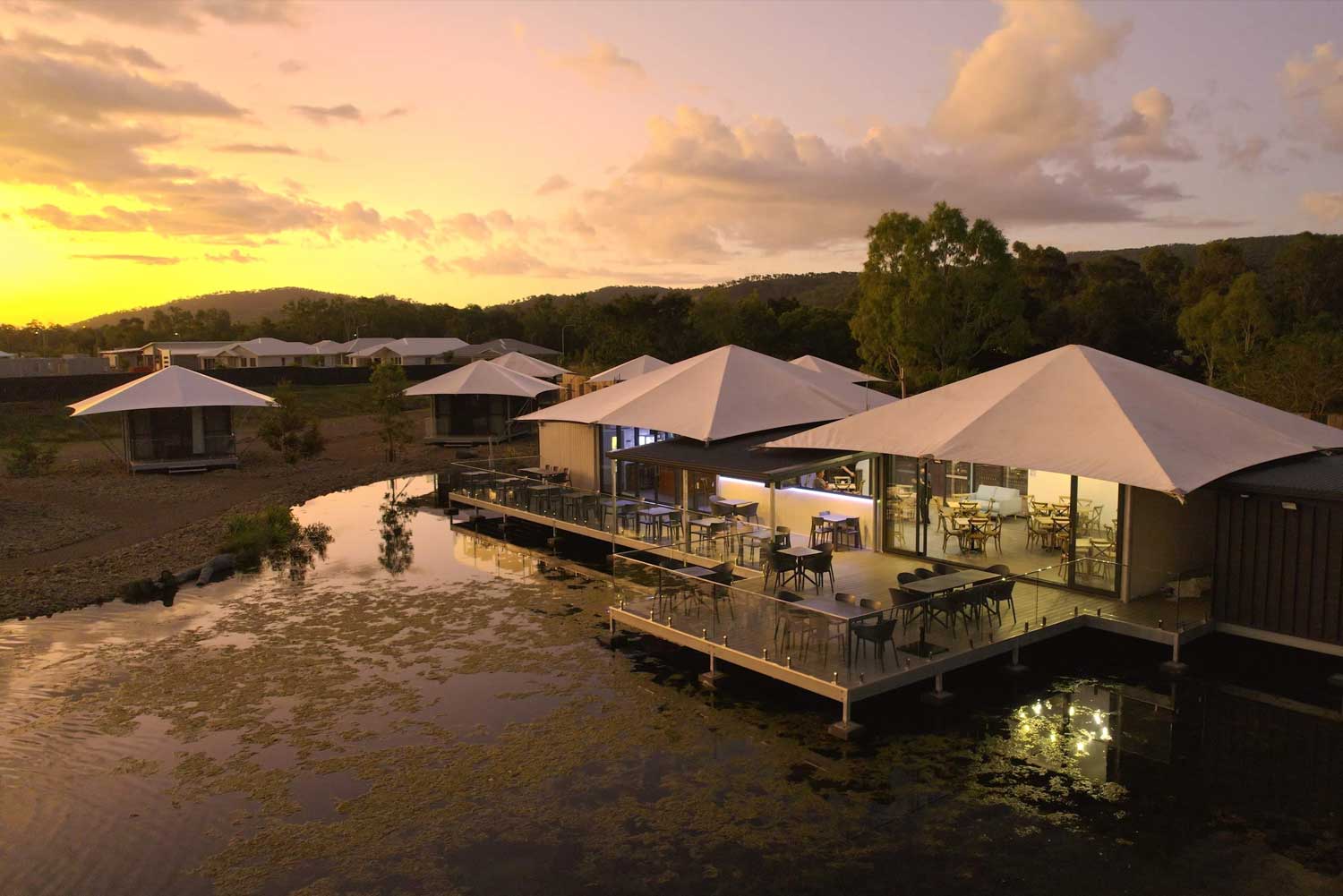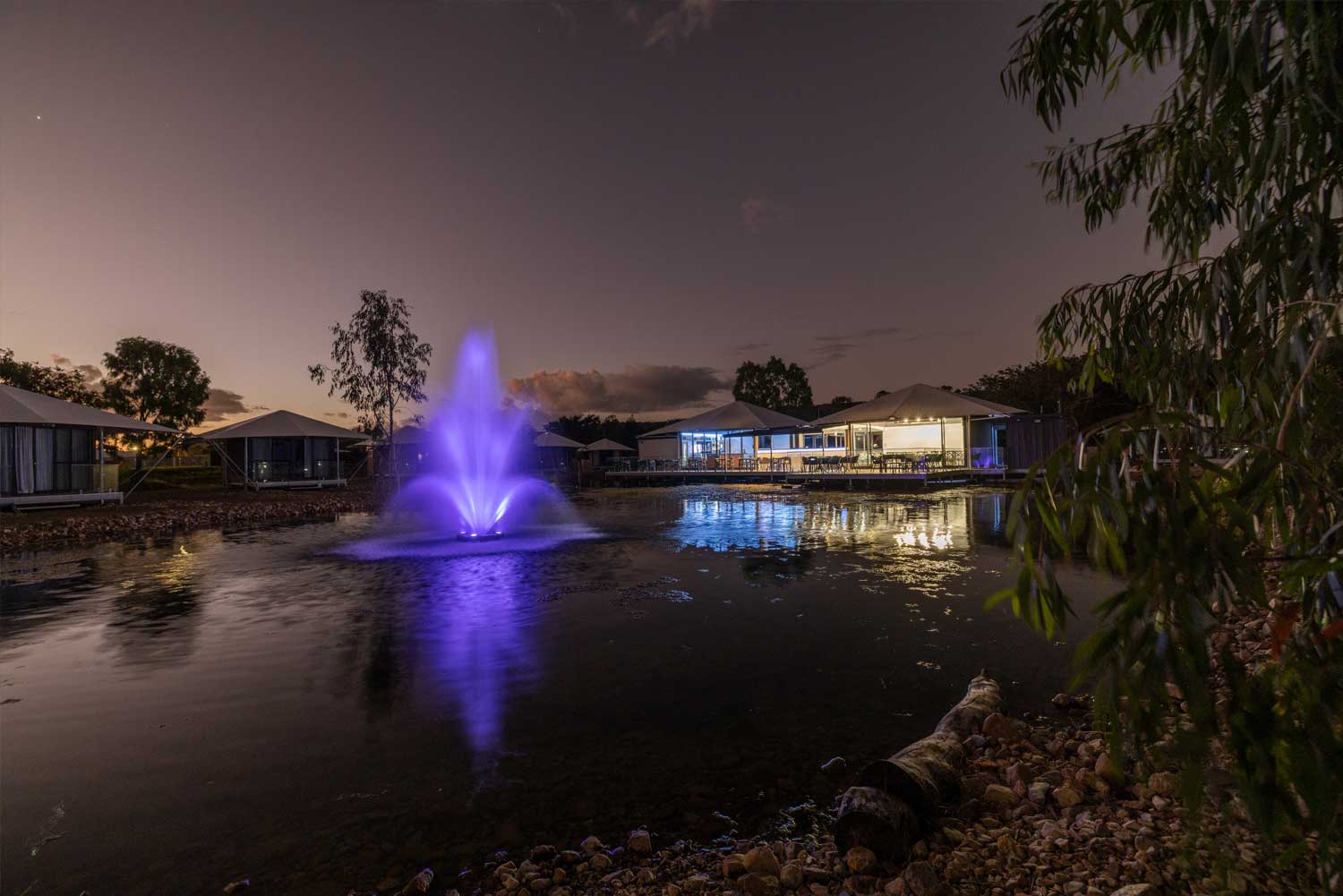16 Oct 2023
Words
John Miller Informer 108
Green acres
Townsville Eco Resort’s evolution towards sustainability best practice is a template for how caravan parks can help aboth the environment and their business.
Fiona and Martin Lidgett’s journey towards sustainable tourism did not start with high ideals to save the planet from impending environmental doom but with a necessity to solve a practical problem: how to purify their caravan park’s harsh bore water so that it wouldn’t block up its toilets.
When the Lidgetts bought Townsville Eco Resort in 2014 the park was not connected to reticulated town water being located some 20 minutes’ drive southeast of central Townsville off the Bruce Highway. Eagerto solve their water issue, the Lidgetts implemented a dual operating system for water accompanied by reverse osmosis that enabled clean water to the park’s facilities and direct bore to its gardens.
Their water solution was so creative they won the Caravan Parks Association of Queensland’s Ray Fitton Award for innovation in 2016. The Lidgetts then became involved with ecoBiz, a free program funded by the Queensland Government and run by the Chamber of Commerce & Industry Queensland, that provides a consultancy service to help minimise energy, waste and water. EcoBiz’s consultant visited the park for a free assessment and formulated a plan for the Lidgetts to implement, which set them on a course towards sustainability best practice that continues to this day.
Since 2018, the park has been an ecoBiz 3-star partner, the program’s highest star rating. In 2021, the park achieved its highest level of certification to date when it was awarded Advanced Ecotourism status by Ecotourism Australia.
The Lidgetts are among a small but growing number of park operators across Australia who see the dual benefits of eco-certification for both the environment and their business. In the Townsville region, the resort remains the only holiday park to be accredited by Ecotourism Australia.
“For the nine years we’ve owned the park, I could see people’s attitudes changing towards wanting to travel more sustainably,” says Fiona. “They are more conscious of the environment.


The 2019 Townsville floods were disastrous for us and the city, but one benefit is that travellers are more conscious of their environmental footprint, and so are we as a business. Our certifications definitely help our business because they show our guests that we follow best sustainability practice in running it.
“It was also a natural progression for us from our Caravan Industry Association of Australia accreditation.
It just made sense to continue that standard. We were already accredited with our own industry, so it made perfect sense for us as a business to continue with accreditation in the environmental space given we were already on that path.”
The 2019 floods forced the Lidgetts to close the park for several months, which they took as an opportunity to further improve their environmental efficiencies, particularly around solar and battery backup. They also had four spare acres out the back of the park which they wanted to turn into something that was low impact in line with their Advanced Ecotourism accreditation.
The result is the park’s two latest initiatives, which the Lidgetts launched in May: 10 high-end glamping tents, as well as Black Barra Bar & Cafe, a 100-seat restaurant that juts out over constructed wetland. The glamping tents sleep two to four guests, are airconditioned and include their own bathrooms and kitchenettes.
The glamping accommodation and restaurant adds to the 18-acre park’s current offering of 134 powered caravan sites, which includes 30 residential land lease tenancies.
The Lidgetts say independent environmental accreditation is the only way to ensure park operators are implementing sustainability best practice.
“There’s a lot of greenwashing out there at the moment,” says Fiona.
“People will say, ‘We’re doing this, we’re doing that,’ when they’re either not doing it or it’s really nothing much at all. It might be just recycling paper.
“We went with Ecotourism Australia because they’re very well known in the caravan park industry and were very supportive of our sustainability efforts.”
The Lidgett’s sustainability efforts show that best practice is good for the environment as well as a business’s balance sheet. By adding solar panels in 2019, the Lidgetts reduced their park’s energy usage by 57 per cent in two months and have slashed their monthly power bill from $12,000 to $8,000.
Fiona says the set-up costs for solar are minimal thanks to the generous government grant scheme which encourages caravan parks to install solar.
Fiona says the other main benefit they’ve reaped is that ecotourism accreditation links their park with destination programming.
“Local councils who have become eco-tourism destinations themselves will promote you front and centre as part of their destination programming,” says Fiona. “Same with Google. If you have eco-accreditation, you’ll get a higher ranking in social media feeds. That’s just one of the ways Google is supporting a more sustainable environment by promoting those of us with the proper credentials.” END
What the industry is doing
The Caravan Industry Association of Australia has partnered with Ecotourism Australia to facilitate access to their experts in sustainable and environmental assessment. The partnership has been developed to ensure the caravan park industry meets the needs of the growing customer expectation regarding environmental and sustainable measures within the park sector.
The partnership is designed to work in with the association’s current accreditation and operational practices as well as continuing its goals towards Thrive 2030, Australia’s national strategy for the long-term sustainable growth of the visitor economy.
The importance of environmental and sustainable measures within the park sector was recognised at the association’s annual conference held on the Gold Coast in May. “For us, it is well and truly top of mind,” says Luke Chippindale, the association’s communications spokesperson. “We want to ensure that whatever happens is industry best practice and doesn’t impose massive challenges to parks when they are both skill and time poor.
While a number of park operators presently conduct their own independent eco-certification, our partnership with Ecotourism Australia will enable us to include sustainability as part of our overall accreditation process.”
